ICMI Newsletter - June 2025
Jean-Luc Dorier (ICMI Secretary-General)
Jinfa Cai (ICMI Vice President)
Lena Koch (ICMI Administrative Manager)
Publishing dates:
March 15, June 15, September 15, December 15
Editorial
Editorial – From the desk of Jean-Luc Dorier, ICMI Secretary-General (2025-2028)
 I was first elected as a member-at-large of the ICMI executive committee in 2012, so I am now starting my fourth consecutive term in the ICMI EC, the second as Secretary-General. In August 2028, I will retire from my position in Geneva University and at the end of 2028 my time on the EC comes to an end.
I was first elected as a member-at-large of the ICMI executive committee in 2012, so I am now starting my fourth consecutive term in the ICMI EC, the second as Secretary-General. In August 2028, I will retire from my position in Geneva University and at the end of 2028 my time on the EC comes to an end.
It is always a new challenge and a great excitement to start a new term and to set some new objectives with a new team. In the meantime, our world feels less and less secure and the recent changes in the geopolitical order affect quite drastically many issues regarding mathematics education in the world. ICMI has therefore a very important role to play and must even more than ever be visible and claim its values of tolerance, diversity and inclusiveness. In my first term as Secretary-General, I have tried to reinforce the connection with ICMI country representatives (CR) and affiliate organizations (AffO). The role and missions of ICMI must be very clear to all and all must feel responsible for the international scope of ICMI, not just the ICMI EC, which is constituted of elected volunteers with limited powers.
In our first EC meeting, in March, 2025 in Berlin, Merrilyn and I presented the structure and the various activities of ICMI to the new EC and set up the basis for renewing our website. This renewed website is now already accessible, even if the final edits will be implemented by the end of June.
Let me explain in this editorial the general overall structure of the new website, which will be a good way to give you a synthetic overview of ICMI.
In the first level of the structure, we have the following six sections:
Organization – ICME – ICMI Studies – Awards – Projects – Around ICMI
Organization is about the general structure of ICMI and it gives information about ICMI, ICMI history, its structure and link to IMU and the International Science Council (ISC) with whom it shares the values inscribed in their statutes. ICMI as a commission of IMU has no statutes of its own but is ruled by Terms of reference. ICMI Members are countries, while the Executive Committee (EC) is its decisional body. The EC is elected by the ICMI country representatives every 4 years through a complex process during the General Assembly. ICMI communicates through its Newsletter published four times per year. It benefits from the IMU Secretariat in Berlin and has a curator, presently Bernard Hodgson, in charge of its Archive.
The International Congress on Mathematical Education (ICME), the ICMI Studies, and the three ICMI Awards are the three main activities of ICMI. Each will have its own section in the new website, with information about the goals of each and its history, including the key details of past events. It also provides specific information on bidding for an ICME, proposing a potential theme for an ICMI Study, or nominating colleagues for each of the three ICMI Awards.
ICMI is also involved in three Projects: Capacity and Networking Project – CANP, ICMI Awardees Multimedia Online Resources – ICMI AMOR, and the Klein Project. All three are presented in detail in the Project section of the website, with several resources online.
Finally, the ICMI website must give information about what concerns mathematics education in the world Around ICMI. This is where the Affiliate Organizations (AffO) will be presented. In this section we will also give a synthetic overview of the Context of countries: how mathematics education is structured in each ICMI Member Country. This will include information on associations for mathematics education, research institutions and journals, mathematics teachers’ education, the national syllabus, and standards. This section will certainly take a while before being completed and will require the help of ICMI CR. The Around ICMI section will also have a link to the International Day of Mathematics.
Of course, a website is only a show window which does not adequately represent the real work done. Yet, ICMI is a complex organization with several intertwined networks implicating lots of volunteers in several part of the world with very different statuses and backgrounds. Therefore, it is important that all of us are well informed about the various aspects of ICMI in order for our work to be as effective and efficient as possible.
We hope that this new website structure with updated information on every page will help in making ICMI better known and enhance its actions in the world.
Award Committees
The ICMI Awards Committees – Thank you to retiring members
Merrilyn Goos, ICMI President
Just below in this newsletter is the call for nominations for ICMI’s three prestigious Awards:
- Felix Klein Award for lifelong achievement in mathematics education research
- Hans Freudenthal Award for a major program of research on mathematics education
- Emma Castelnuovo Award for outstanding achievements in the practice of mathematics education
Two selection committees for these three Awards are appointed by the ICMI President.
Names of the active members of these committees, except for their Chairs, are not made known until their terms of office expire.
At this time, the ICMI Executive Committee would like to thank Helen Forgasz for her leadership as Chair of the Emma Castelnuovo Award Committee from 2021-2024 and as a member of this committee from 2017-2020.
We congratulate Kaye Stacey on her appointment as the Chair of the 2025-2028 Emma Castelnuovo Award Committee. We are delighted that Alan Schoenfeld has agreed to continue his role as Chair of the Klein and Freudenthal Awards Committee for another four years (2025-2028).
We also thank the following Award Committee members, who have now completed their term, for their dedication and commitment to carrying out this important task:
Castelnuovo Award Committee:
Kyong-Hwa Lee, Monica Villareal, Zalman Usiskin, Hugh Burkhardt (who sadly passed away in 2024)
Klein and Freudenthal Awards Committee:
Fou-Lai Lin, Ravi Subramaniam, Nathalie Sinclair
Call for 2028 ICMI Awards
Call for the 2028 ICMI Awards:
- Felix Klein Award for lifelong achievement in mathematics education research
- Hans Freudenthal Award for a major program of research on mathematics education
- Emma Castelnuovo Award for outstanding achievements in the practice of mathematics education
Deadline for nominations for the three Awards is: November 30, 2026.
Call for proposals for ICMI Studies
ICMI Studies are a central activity of the International Commission on Mathematical Instruction. An ICMI Study addresses a theme of particular significance to contemporary mathematics education and is conducted by an international team of leading scholars and practitioners. The team is appointed by the Executive Committee of ICMI and it is expected to conduct the Study in line with the guidelines.
Each Study is built around an international conference and results in a published Study Volume. The Study Volume is a critical review and synthesis of the domain that also anticipates future trends and needs.
The ICMI Executive Committee is now calling for proposals for future ICMI Studies.
The proposal may be submitted by individuals or teams of leading scholars in the field representing the proposed theme. The proposal should use the template (see link below) and be no more than one page in length.
ICME-17 (2032) Bids
Call for intention to Bid to organize and host ICME-17 in 2032
ICME is the largest international conference on mathematics education. It is held every leap year and it is the meeting point for mathematics educators, curriculum developers, mathematicians, researchers in mathematics education, teachers, teacher educators, and resource producers.
The three ICMI Awards to recognize outstanding achievement in mathematics education are presented at the ICME Opening Ceremony. The Felix Klein Award and Hans Freudenthal Award were established in 2000 and first presented in 2003. While the Felix Klein Award honors lifetime achievement in mathematics education research, the Hans Freudenthal Award instead recognizes a major cumulative program of research. The Emma Castelnuovo Award, first presented in 2016, acknowledges outstanding achievements in the practice of mathematics education.
On the day before the ICME Opening Ceremony, the ICMI hosts a one-day meeting of its General Assembly (GA). Recent ICMEs have also featured a separate Early Researcher Day, usually held before the Congress begins.
ICMI is hereby inviting the ICMI community (ICMI country representatives, national/regional mathematics education and mathematics organizations, and academic institutions) to consider the possibility of organizing and hosting the International Congress on Mathematical Education in July/August 2032.
Please note: Applications by convention centers, tourist agencies, or any other commercial organization will not be considered.
ICMI AMOR
ICMI AMOR Advisory Board
Jean-Luc Dorier
At its Executive Committee Meeting held on March 10-12, 2025, ICMI decided to set up an Advisory Board for the ICMI Awardees Multimedia Online Resources Project– ICMI AMOR .
The roles of the Advisory Board are to:
- Establish priorities for new AMOR units to be created and help with contacting people who can design these new units.
- Help anyone who wants to start building a new AMOR unit in the project, explaining the goals and the format and interacting with this person or persons about the various design possibilities.
- Identify the ideal characteristics for each new AMOR unit to be added based on features of units that have already been designed and published.
- Offer advice and feedback on the design of a whole AMOR unit and each module in it. This is not a formal review but instead an advisory process to help optimize the quality of the finished product.
- Take action to promote the project to new and existing audiences and to enhance its impact. This means reviewing what is known about existing use of the AMOR units and proposing new uses and new audiences. It also means communicating about the project and its possible uses via various media and conferences.
The members of the Advisory Board are appointed by ICMI EC for a period of 4 years.
The Advisory Board is composed of a balanced mixture of persons active in the origin of AMOR and senior and junior researchers in mathematics education working and living in different parts of the world and using different theoretical tools, reflecting the possible users of the ICMI AMOR Projects. The total number of Advisory Board members should be between 9 and 15.
Below is the list of first appointees (April 1, 2025- 31.March 2029)
- Michèle Artigue (France)
- Marianna Bosch Casabò (Spain)
- Nadav Ehrenfeld (USA/Israel)
- Anthony Essien (South Africa)
- Fraser Gobede (Malawi)
- Xingfeng Huang (China)
- Ruchi Sunil Kumar (India)
- Nathan Lombard (France/Switzerland)
- Daniela Pages (Uruguay)
- Anna Sfard (Israel)
The work of the Advisory Board will be chaired by Betina Duarte, who as ICMI Vice-President is in charge of the ICMI AMOR Project.
EMF 2025
Report on the 9th EMF Symposium – Montreal 2025
Fabienne Venant, EMF-2025 Convenor
Faten Khalloufi, EMF Executive Bureau President
Website: https://sites.google.com/view/emf2025
Watch the video of the event: https://www.youtube.com/watch?v=JVKFsCCrc00
From May 26 to 30, 2025, the University of Quebec in Montreal (UQAM) hosted the 9th edition of the Espace Mathématique Francophone (EMF) Symposium, organized in partnership with a consortium of Quebec universities including: UQAM, Université du Québec en Outaouais, Université du Québec en Abitibi-Témiscamingue, Université du Québec à Rimouski, Université du Québec à Trois-Rivières, Université de Sherbrooke, Université de Montréal, and Université Laval.
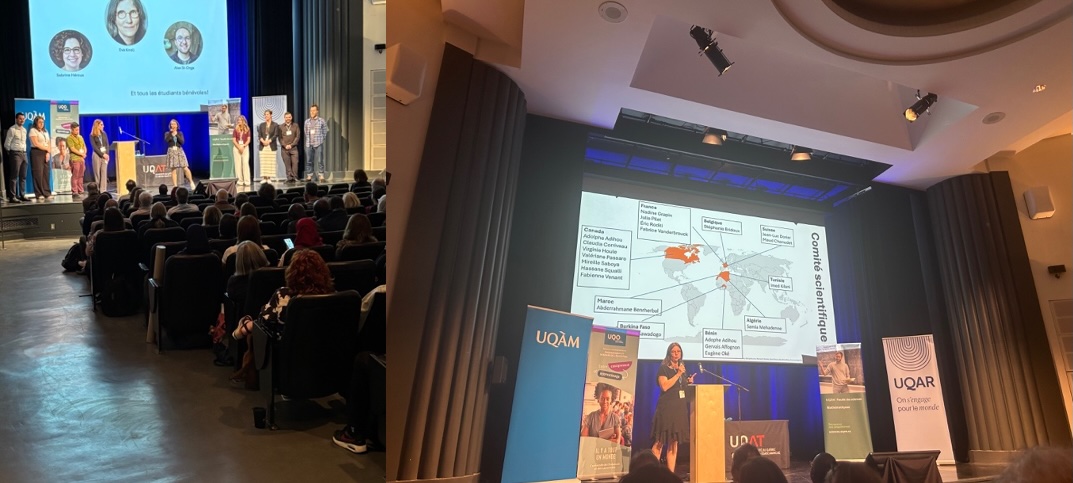
Under the theme “Mathematics Education in an Accelerating World: Challenges and Opportunities,” the event brought together 221 participants. Registrants came from 15 countries, creating a unique space for dialogue among researchers, educators, and policymakers from across the Francophone world.
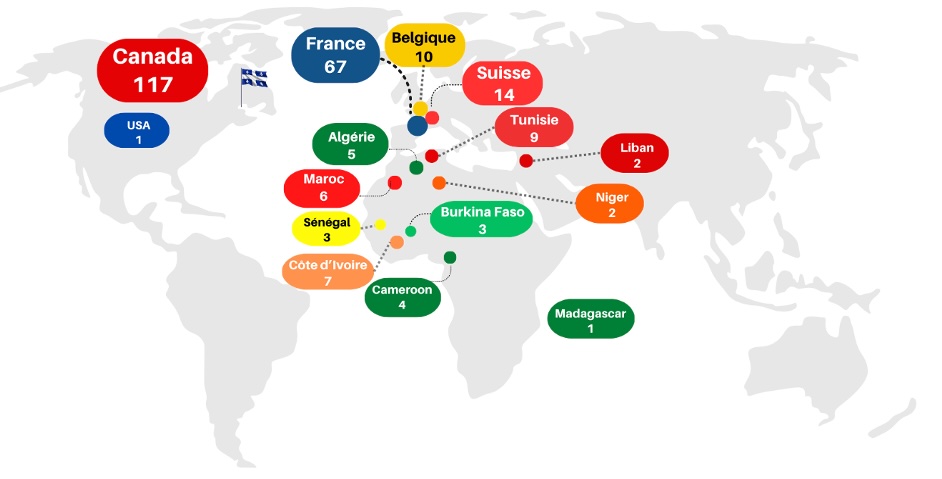
A Rich and Diverse Scientific Program
The symposium balanced theoretical reflections and innovative practices through a variety of formats. Two plenary lectures on topics directly linked to the main theme were delivered. Fabien Torres (Canada) introduced the concept of resonance as a sociological approach to the problem of social acceleration. Louise Poirier (Canada) gave a sensitive demonstration of how mathematics and mathematics education can foster social and cultural responsibility. In addition to the plenary lectures, EMF 2025 featured two participatory roundtables addressing urgent questions about the role of mathematics education in shaping tomorrow's society and the importance of collaboration in research and education. These discussions were complemented by 11 working groups which explored more specific topics in greater depth. Participants also had the opportunity to explore emerging themes through 10 scheduled discussions and three special projects, including the Young Teachers Project (May 22-26) designed to support early-career educators.
Innovation at Its Core
The 2025 edition offered different innovations to respond to EMF's vocation to open researchers' reflections to a wider audience of practitioners and citizens.
A public lecture co-hosted by Nadia Lafrenière (Canada) and Judith Sadja-Njomgang (Cameroon) explored the question of time in mathematics and learning. This lecture was given in comodal mode to reach a wider audience.
The ‘Maths en action’ workshops gave participants the opportunity to share new mathematical experiences and explore the beauty and complexity of mathematics through art, crafts, and games. The colloquium also had the good fortune to host the launch of the “Esthétique de la complexité mathématique” exhibition, set up by artists Eva Knoll and Myriam Boucher-Pinard (Canada).
A standout innovation of this edition was the introduction of 5@7 Connection sessions; a groundbreaking hybrid networking format developed in collaboration with École en réseau. These networking sessions were offered on a comodal basis to enable Canadian practitioners to join. Thanks to this initiative, real exchanges between practitioners and researchers occurred by cross-fertilizing expertise. These late-afternoon discussions, centered on themes like assessment practices and adaptive pedagogies, fostered dynamic exchanges between researchers and practitioners, transcending institutional and geographical boundaries.
All lectures will soon be available for replay on the colloquium website.
Key Takeaways and Recommendations
EMF 2025 demonstrated the vitality of the Francophone mathematics education community while identifying areas for future growth. The success of the 5@7 Connection sessions suggests expanding this model in future editions, potentially incorporating more collaborative digital tools.
In conclusion, EMF 2025 not only upheld the symposium's tradition of academic excellence but also demonstrated the collaborative strength of the community and its openness and consideration for the diversity of those involved in mathematics education. It broke new ground through innovative formats like the 5@7 sessions, redefining how the Francophone mathematics community can collaborate to address contemporary educational challenges.
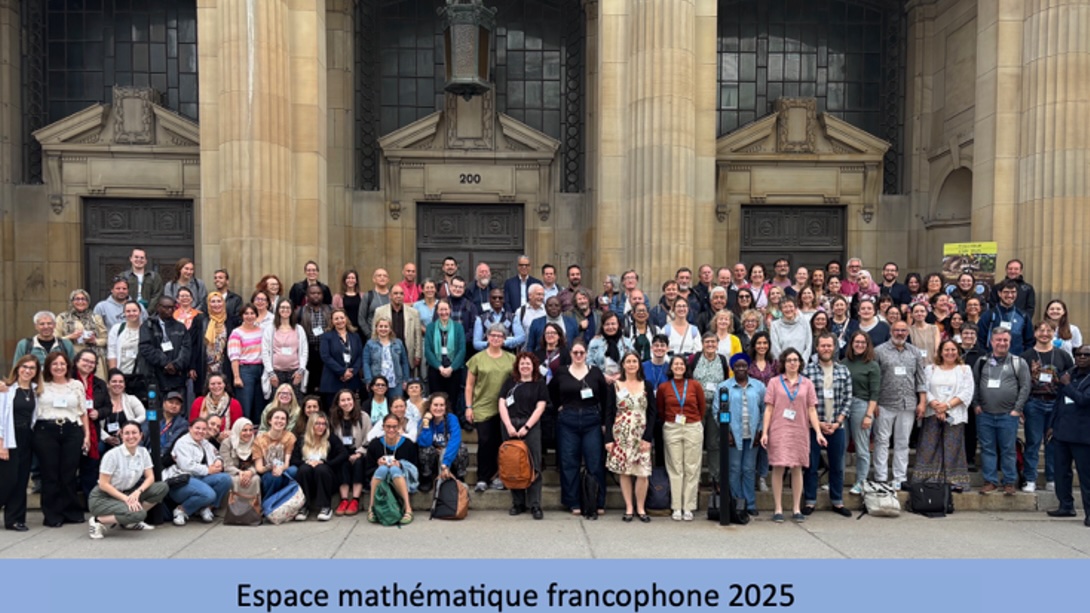
News from the EMF Executive Board
During the symposium, the EMF Executive Board renewed four of its members
New members: Fabienne Venant (Canada), Maud Chanudet (Switzerland), Mohamed Sagayar Moussa (Niger), Faguèye Ndiaye Sylla (Sénégal)
Members starting their second term: Adolphe Adihou (Canada/Benin), Said Abouhanifa (Maroc), Isabelle Demonti (Belgique), Viviane Durrand-Guerrier (France).
Next EMF Symposium
From the applications received, the board has selected the host country of the next EMF Symposium. EMF2029 will be held in Brazzaville, Congo.
ICME-16
Updates from ICME-16
Naďa Vondrová Convenor, ICME-16
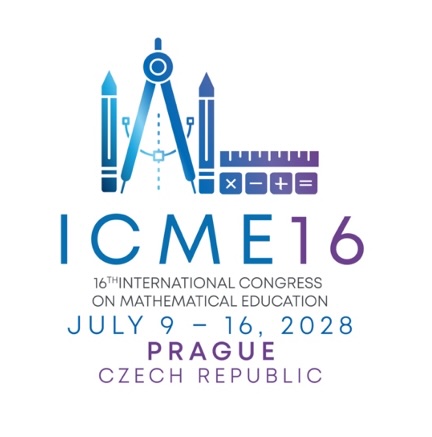 The preparation for ICME-16, which will take place in Prague from July 9-16, 2028, is well underway. The International Program Committee (IPC) has been contacted and the process of nominating individuals responsible for shaping the scientific program has already begun. This includes the selection of speakers for regular and plenary lectures, the proposal of themes for plenary panels, and the review and refinement of topics for the various Topic Study Groups, including suggestions for new ones.
The preparation for ICME-16, which will take place in Prague from July 9-16, 2028, is well underway. The International Program Committee (IPC) has been contacted and the process of nominating individuals responsible for shaping the scientific program has already begun. This includes the selection of speakers for regular and plenary lectures, the proposal of themes for plenary panels, and the review and refinement of topics for the various Topic Study Groups, including suggestions for new ones.
National teams are actively working on the content of the National Presentations of the organizing countries. One of the key initiatives from the Czech organizing team is the finalization of a book manuscript dedicated to an innovative approach to mathematics education in the Czech Republic. The book, being published by Routledge, is expected to be released in time for the Congress and will introduce international researchers to the origins and current development of this distinctive method.
To support efficient collaboration, we have established a shared platform (SharePoint) for the IPC and the Local Organizing Committee (LOC), enabling smooth communication and document sharing.
A significant milestone ahead is the joint preparation week of the IPC and LOC, scheduled for September 15–19, 2025, which will be an intensive working session focused on shaping the congress program.
We are also making progress on the development of the official congress website, which will serve as a central hub for information and communication with participants (ICME-16).
We are grateful to the organizers of ICME-15 in Sydney 2024 for their continued support, sharing their valuable expertise and advice. Their guidance is helping us avoid common pitfalls and focus on what truly matters in organizing a successful and impactful congress.
News from IMU
1. Registration for the ICM 2026
Please note that registration for the International Congress of Mathematicians (ICM 2026) is open and with the following deadlines:
- Early Advanced: Register by August 1, 2025
- Advanced: Register by May 11, 2026
To benefit from reduced rates, complete the registration process by these deadlines.
I look forward to seeing you in Philadelphia.
Christoph Sorger, IMU Secretary General
2. Nominees for IMU President and Secretary General for 2027–2030
In his IMU AO Circular Letter 2/2025, IMU President Hiraku Nakajima announced the Nominating Committee's unanimous proposal for President and Secretary-General of the IMU for the term 2027–2030:
- IMU President: Ulrike Tillmann, UK
- IMU Secretary-General: Christoph Sorger, France (incumbent)
The election will take place at the 20th IMU General Assembly on July 20–21, 2026 in New York City, USA.
News from Affiliate Organizations
CIEAEM
News from CIEAEM (The International Commission for the Study and Improvement of Mathematics Teaching)
Cristina Sabena - President of CIEAEM
Lisa Björklund Boistrup - Secretary of CIEAEM
Update on CIEAEM 76: Transition to a Webinar Series in Fall 2025
CIEAEM 76 was originally scheduled to take place on-site in Philadelphia in July 2025. However the in-person conference has been cancelled. In response, and to maintain the momentum of our scientific dialogue, the CIEAEM community will instead host a series of three online seminars during fall 2025.
These webinars will take place from 16:00 to 18:00 CET on the following dates: October 3, 2025; November 14, 2025; December 5, 2025.
The series will retain the theme and subthemes developed by the International Program Committee (IPC), chaired by Peter Appelbaum, for the original Philadelphia conference. The overarching theme is: “How can mathematics education curriculum anticipate and prepare for a changing world?” The webinars will explore how mathematics education can respond to the pressing global challenges of our time—including rapid technological advancements, environmental crises, and deepening social inequalities. Each session will include time for discussion and may also feature hands-on workshops.
Seminar 1: October 3, 2025 - Focus: General theme and the subtheme “Technologies and Challenges” Confirmed Speakers/Discussants: Chronis Kynigos, Nathalie Sinclair, David Wagner Organizers: Gilles Aldon, Andreas Moutsios-Rentzos, Cristina Sabena
Seminar 2: November 14, 2025 - Focus: “Environment and the More-than-Human” and “Public Mathematics and "Social Justice Issues in Mathematics Education” Organizers: Javier Díez-Palomar, Benedetto Di Paola, Susan Gerofsky, Michaela Kaslová
Seminar 3: December 5, 2025 - Focus: “Teachers, Teacher Education and Teacher Professional Development” and “Early and Primary Mathematics for New Realities” Organizers: Gilles Aldon, Audrey Cooke, Alexandra Gomes, Cristina Sabena
For more detailed information about the themes, please consult the Second Announcement of CIEAEM 76
For questions or further information, please contact: Cristina Sabena via email and Lisa Bjorklund via email.
ISDDE
News from International Society for Design and Development in Education (ISDDE)
Christian Schunn (Former Executive Chair; Journal Committee Chair)
The University of Galway, Ireland hosted the International Society for Design and Development in Education (ISDDE) conference from May 19–22, 2025.
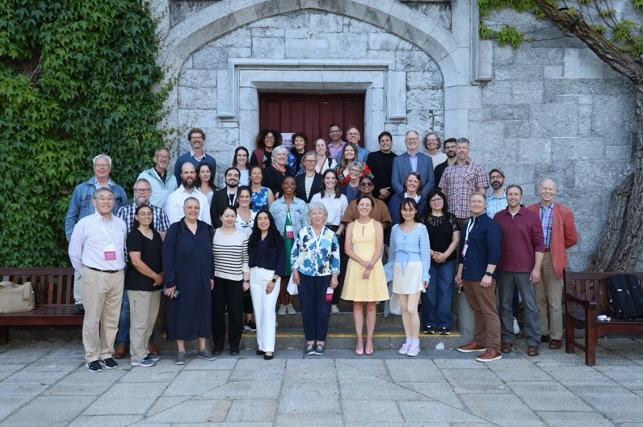 Since its founding in 2005, ISDDE has brought together a global community dedicated not only to improving educational materials but also to deepening the professional craft of educational design itself.
Since its founding in 2005, ISDDE has brought together a global community dedicated not only to improving educational materials but also to deepening the professional craft of educational design itself.
Professor Cornelia Connolly, University of Galway and Executive Chair of ISDDE, explains that the society has championed the principle that the design of learning tasks, assessments, teacher professional development, and systems that integrate these—grounded in research, design expertise, and strategic design practice—is essential to meaningful educational progress.
This year’s conference theme, ‘Expansive Design Across Borders, Cultivating Joy in Learning,’ so fittingly situated in Ireland, reminds us that innovation doesn’t only emerge from the center but that it often flourishes at the intersections: of disciplines, of cultures, and of perspectives.
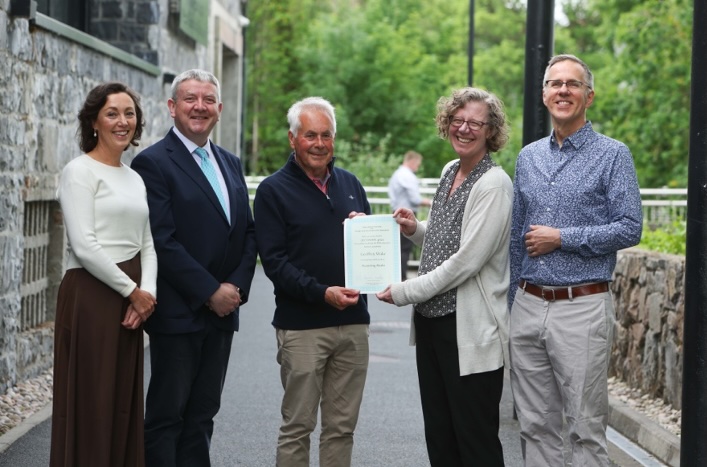 At the conference, the winner of the prestigious ISDDE Prize for Excellence in Educational Design, or “Eddie”, was announced. The prize, funded by the Bell Burkhardt Daro Shell Centre Trust, is given annually to recognize excellence in design for education in mathematics, science, or technology. The 2025 award was given to Geoffrey Wake, Emeritus Professor at the University of Nottingham, for his work leading the team that designed the Mastering Maths project. This research and design project, centered at the University of Nottingham over the past decade, has focused on the problem of students who fail to achieve a passing mark in the public examination in mathematics taken at the age of 16 and for whom subsequent remediation has met with limited success. For more information about Mastering Maths, visit www.masteringmaths.org/
At the conference, the winner of the prestigious ISDDE Prize for Excellence in Educational Design, or “Eddie”, was announced. The prize, funded by the Bell Burkhardt Daro Shell Centre Trust, is given annually to recognize excellence in design for education in mathematics, science, or technology. The 2025 award was given to Geoffrey Wake, Emeritus Professor at the University of Nottingham, for his work leading the team that designed the Mastering Maths project. This research and design project, centered at the University of Nottingham over the past decade, has focused on the problem of students who fail to achieve a passing mark in the public examination in mathematics taken at the age of 16 and for whom subsequent remediation has met with limited success. For more information about Mastering Maths, visit www.masteringmaths.org/
ICTMA
News from the International Study Group for Mathematical Modelling and Applications
Vince Geiger (President)
ICTMA conference Organizers are thrilled to have received over 170 abstract submissions from researchers and educators around the world. The program is rich and varied, reflecting the global diversity and innovation in mathematical modelling education. Keynotes, plenaries and panel discussion will cover a wide range of topics including the role of modelling in scientific investigations, AI and mathematical modelling education, and mathematical modelling for responsible and critical citizenship.
Keynote and plenary presentations for the conference are listed below.
Keynote
- Professor Gabriele Kaiser (University of Hamburg, Germany; Nord University, Bodø, Norway)
Plenaries
- Professor Kimmo Ericsson (Mälardalen University College, Sweden)
- Professor Daniel Orey (Federal University of Ouro Preto, Brazil)
- Associate Professor Serife Sevinc (Middle East Technical University, Turkey; T.U. Dresden, Germany)
- A fourth dual plenary on the topic AI and mathematical modelling education – challenges and opportunities will be given jointly by Senior Lecture Kerri Spooner (Auckland University of Technology, New Zealand) and Associate Professor Takashi Kawakami (Utsunomiya University, Japan).
A panel discussion on Mathematical Modelling and Responsible and Critical Citizenship moderated by Professor Pauline Vos (Western Norway University of Applied Sciences, Norway) will conclude the conference and include the following panelists:
- Professor Marcelo C. Borba (State University of São Paulo, Brazil)
- Professor Vince Geiger (Australian Catholic University, Australian)
- Associate Professor Britta Eyrich Jessen (University of Copenhagen, Denmark)
- Professor Hans-Stefan Siller (Universität Würzburg, Germany)
Early Career Researchers Day
A highlight of the conference will be the Early Career Researchers Day which will take place as part of the ICTMA22 conference on Sunday, 10 August. This will provide opportunity to exchange ideas with fellow ECRs and with experienced researchers, to network and to gain valuable advice about how to develop an academic career. The day will include opportunities to work with experts in the field, including Prof. Dr Vince Geiger, Prof. Dr Peter Galbraith and Assoc Prof. Lisa Steffensen. Prof. Dr Pauline Vos will lead the event.

The organizers of the conference warmly welcome all participants and look forward to insightful discussions, networking, and a memorable conference experience in Linköping!
Visit the conference website for details and updates: https://liu.se/en/research/ictma22
Contact: ICTMA22@mai.liu.se
Henry Pollak Award for Prof. Dr Gabriele Kaiser
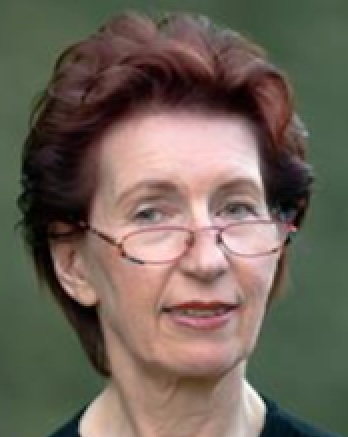 Gabriele Kaiser will receive the Henry Pollak Award from the ICTMA this year. The ceremony will take place at the ICTMA22 conference in Linköping. Prof. Dr Gabriele Kaiser is one of the most important international experts in the field of mathematical modelling education. She has significantly shaped the ICTMA. She was President of ICTMA twice (2007-2011, 2019-2023), organized ICTMA-14 in Hamburg in 2009 and has been co-editor of the ICTMA conference proceedings since 2017. She also heads the book series ‘International Perspectives on the Teaching and Learning of Mathematical Modelling’.
Gabriele Kaiser will receive the Henry Pollak Award from the ICTMA this year. The ceremony will take place at the ICTMA22 conference in Linköping. Prof. Dr Gabriele Kaiser is one of the most important international experts in the field of mathematical modelling education. She has significantly shaped the ICTMA. She was President of ICTMA twice (2007-2011, 2019-2023), organized ICTMA-14 in Hamburg in 2009 and has been co-editor of the ICTMA conference proceedings since 2017. She also heads the book series ‘International Perspectives on the Teaching and Learning of Mathematical Modelling’.
Gabriele Kaiser has made a decisive contribution to the theoretical foundation of modelling; for example, her work on modelling perspectives, competence models and teacher beliefs. Her high level of recognition is reflected in numerous publications. She has also supervised ten doctoral and post-doctoral theses in the field of modelling, as well as many others in other areas of mathematics education.
We congratulate Gabriele Kaiser on this honor and will report on the ceremony in our next newsletter.
News from ICMI Country Representatives
Chile
News from Chile - Connecting society with mathematics through a diversity of spaces and people
Leslie Jiménez Palma and Mariela Carvacho ICMI Representatives for Chile, Paola Comparín, Secretary of the Chilean Mathematical Society, Mauricio Godoy, President of the Chilean Mathematical Society
Second year of the National Mathematics Week in Chile
Last year, the Ministry of Education together with the Chilean Mathematical Society SOMACHI and the Chilean Mathematics Education Society SOCHIEM announced the creation of the National Mathematics Week. It was created to celebrate the legacy of Guacolda Antoine Lazzerini (1908–2015), a distinguished mathematics and physics teacher and the first woman to be elected dean at Universidad Técnica del Estado. SOMACHI and SOCHIEM are consistently committed to promoting outreach activities with the aim of bringing mathematics closer to students across Chile, inspiring curiosity and nurturing talent. For this reason, the creation of this week is a significant achievement: establishing a dedicated space in school calendars for mathematics, offering teachers the opportunity to engage students with activities that increase their interest in math.
In 2025, the Week took place from April 7th to 11th, and the central theme was “Mathematics, art, and creativity.” In the south of Chile, various activities were carried out; in the Araucanía region there were activities for more than 300 students, led by Universidad de la Frontera (UFRO). Some of the activities were the Math Games Room, Art and mathematics, the workshops Let's use the computer to approximate Pi and The Little Prince and the circumference, and the talk Bees, oranges, and secrets and exploring hyperbolic geometry in the art of crochet, among others. In Osorno, the meeting Art and Math also took place, organized by Circulo Kimche at Andalue school.
In Santiago de Chile, several activities were carried out by Universidad de Chile, led by the outreach committee of the Department of Mathematics, Faculty of Sciences, University of Chile (DM-UCH). These activities mainly involved visits to primary and secondary schools to give the talks An equation that predicts the weather and The great adventure of writing and drawing mathematics (Based on the book The Great Adventure of Knowledge, written by Leslie Jiménez and Constanza Rojas-Molina) Also, the mathematics communication group of the department COMPAS Uchile, made up of students in different levels, participated as monitors of the activities, setting up math stands such as modular origami and math-magic, for more than 200 students in total.

Figure 1. Activities in the second year of The National Mathematics Week in Chile.
May 12: Celebrating women in mathematics from the south
Inspired by the goal of the day proposed by CWM about inspiring women everywhere to celebrate, many women academics in Chile organized a diverse number of activities to encourage an open, welcoming, and inclusive work environment for everybody. The activities took place in several regions in Chile, from the very north in the Arica and Parinacota Region to the south in the Los Lagos Region: 13 activities were registered in the official page of May 12 (Figure 2), and that amount is the minimum number of activities that occurred. The activities registered were the proyección documentary “Secrets of the Surface: The Mathematical Vision of Maryam Mirzakhani” (Universidad Católica de Chile (UC)), the documentary together with a debate about gender and mathematics (DM-UCH), Infographics about Women Mathematicians (Universidad de Valparaíso), Geometry and Women Pioneers (Universidad Austral de Chile), the challenge of a more equitable science and weaving networks (UC), the exhibition “History of Women Mathematicians” (UFRO), Women + Mathematics (Universidad de Chile and Piñera-Morel foundation), Celebration of International Day of Women Mathematicians (Universidad de Tarapacá, Universidad Católica de Valparaíso, Universidad Metropolitana de Ciencias de la Educación, Universidad de Los Lagos), and Matrices of Change: International Women in Mathematics Day (Universidad Federico Santa Maria).
The Ministry of Science and Technology in Chile and the Chilean network of mathematical outreach joined the celebration of the day with news and the note Voices and Territories on Women in Mathematics Day. The activities were mainly focused on two goals: 1) visibility of contributions of women in the past and the present, considering the history of the women pioneers in the area, and 2) reflection on the varied paths of women in the field and how the incorporation of a diversity of people suggests changes in the form and practice of mathematics itself in academia.
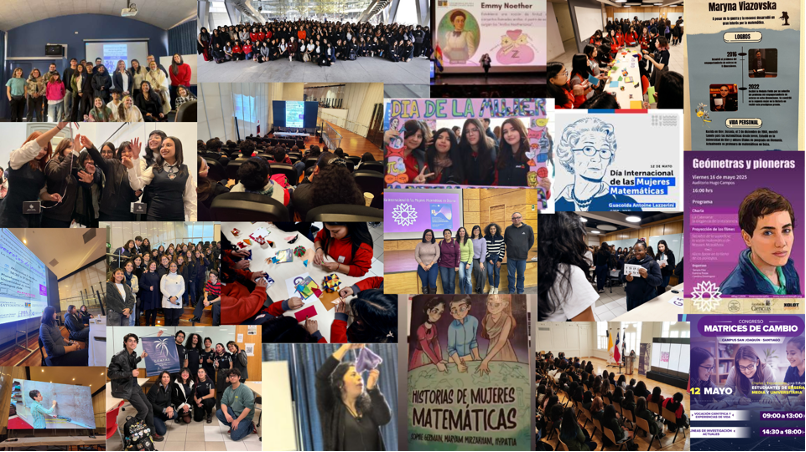
Figure 2. Photos from May 12 events in Chile registered on the webpage.
Estonia
News from Estonia
Hannes Jukk, ICMI Representative for Estonia
The Institute of Computer Science presents an exhibition connecting art and science, titled “Geometry. Thought Patterns and Reflections,” at the Delta Study Building. The exhibition showcases art based on geometric principles. The exhibition is part of the "Order and Chaos" event series, organized in collaboration with the art galleries of seven academic buildings of the University of Tartu. The exhibition's concept and curation are by artist Kärt Summatavet. The opening date of the exhibition in the Delta Study Building was chosen as March 14, which is Mother Language Day in Estonia, but more widely known as Pi Day. (https://cs.ut.ee/en/content/exhibition-geometry-thought-patterns-and-reflections)
There is a shortage of teachers in Estonia, especially science and mathematics teachers. Efforts are being made to improve the situation in many ways. This summer, the University of Tartu will accept an additional speciality curriculum for mathematics teachers. Already, students of the class teacher specialty (starting to teach in grades 1 to 6) can choose English language or technology studies as an additional specialty, but if they have strong potential in mathematics, they will soon be able to choose the additional specialty of mathematics teacher (to teach mathematics until the end of basic school).
In order to motivate bachelor’s students of mathematics and mathematical statistics to continue in the master’s curriculum of Mathematics and Computer Science, the targeted financial scholarship for teacher training aimed at applicants in 2025 is 4,000 euros (2,000 euros per academic year). This is in addition to the €400 per month teacher training stipend, which is received by 80% of the students in the curriculum.
With the support of Estonian companies, an educational programme "Charge Yourself" was created for physics and chemistry teachers in 2022. Tallinn University of Technology started cooperating with the "Charge Yourself" programme primarily thanks to the involvement of mathematics teachers. Tallinn University of Technology wishes to improve the level of mathematics teaching in Estonia. This year, 10 basic school chemistry teachers and 10 basic school mathematics teachers will be able to participate in a modern training program that will run from August to December 2025. Teachers visit companies where they get an overview of the practice of chemistry, mathematics, and physics in professional work. The teachers will also meet with several experts and alumni of the education programme "Lae end."
The Estonian Mathematics Society in cooperation with the University of Tartu Youth Academy (https://teaduskool.ut.ee/en) invited mathematics teachers with less experience to a training course "Mathematically gifted students in the fourth grade." The training looked at the topics, tasks, strategies, and places in solutions that students should pay attention to and the principles for evaluating solutions.
Two higher education institutions in Estonia (Tallinn University and University of Tartu) engaged in teacher training started joint work in connection with the development of methodology for learning and teaching mathematics. The name of the joint project is COOLMATH "LAHEMATE: Learner-centred Mathematical Problem-Solving Teaching Methodology Development Study".
Iran
News from Iran - The “Spring Week of Mathematics” in every corner of Iran
Abolfazl Rafiepour, ICMI Representative for Iran and Ali Rahimi, Prospective teacher of Mathematics, Shahid Bahonar University of Kerman, Kerman, Iran.
The annual Spring Mathematics event is scheduled to take place from May 11-18 each year, coinciding with the birthday of the late contemporary Iranian mathematician Maryam Mirzakhani (Fields medalist) and ending with the birthday of Hakim Omar Khayyam Neyshaburi (who was a Persian mathematician, astronomer, and poet known for his quatrains and who lived from 1048-1131).
This annual event was proposed at the 53rd board meeting of the Union of Iranian Mathematical Societies on February 15, 2023, to motivate Iranian children and adolescents to think mathematically and was named “Spring Mathematics Week.” The event is hosted by experienced educators and trainers (teachers and principals) interested in creative and student-centered education.
Location: Mathematics Houses, Schools, Mathematics-related associations
Program Audience: Preschool and elementary school children, teenagers, their parents and young educators (tutors, teachers and principals)
Objectives:
- Creating opportunities for children and teenagers to understand mathematical concepts with different strategies
- Creating motivation and interest and nurturing the hidden talents and abilities of children and teenagers in understanding mathematical concepts
- Creating conditions for cooperation and dialogue between children and teenagers to examine and solve problems by themselves
The Seventh Celebration of “Women in Mathematics Day” organized by the Iranian Mathematical Society, May 12, 2025
On the occasion of “Women in Mathematics Day” (May 12), the Women’s Committee of the Iranian Mathematical Society organized the seventh annual celebration of this global event. The program was held online on Monday, May 12, 2025 (Ordibehesht 22, 1404), from 17:00 to 19:00 Iran time. The event opened with remarks by Dr. Omid Alikaramzadeh, President of the Iranian Mathematical Society, and Dr. Ashraf Daneshkhah, Chair of the Women’s Committee. Both emphasized the importance of supporting women in mathematics and fostering equal opportunities in the field. Below is the poster of this program in the Persian language (the official language in Iran).

The scientific part of the program featured two keynote lectures:
- Dr. Laura Monk, from the University of Bristol (UK) and recipient of the Maryam Mirzakhani New Frontiers Prize (2024), gave a talk titled “What does a hyperbolic surface look like?” In her lecture, she introduced the audience to hyperbolic surfaces—geometric structures with constant negative curvature—and highlighted the elegant mathematical tools inspired by Maryam Mirzakhani's groundbreaking work.
- Dr. Maliheh Hosseini, from K. N. Toosi University of Technology and recipient of the Maryam Mirzakhani Prize awarded in Iran (2024), presented a lecture titled “On linear isometries of absolutely continuous function algebras.” She explored the theory of norm-preserving linear maps between function algebras, bridging algebraic and topological structures in a rigorous mathematical framework.
The event also included the screening of a short video showcasing the activities and achievements of the Women’s Committee of the Iranian Mathematical Society over the past year. At the closing, the Maryam Mirzakhani Prize was officially awarded to the winners in recognition of their excellence in mathematical research. Dr. Somiyeh Moradi (pictured below), Associate Professor of the Faculty of Basic Sciences, won the Maryam Mirzakhani Award in 2025.
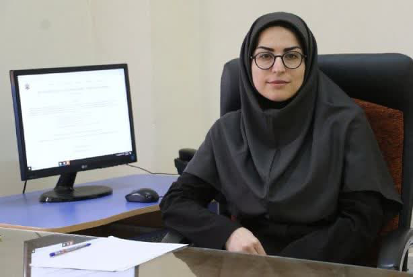
Why Mathematics and Statistics Matter More than Ever in Teaching: A Talk by Dr. Mir Omid Haji Mirsadeghi on the occasion of the “Spring Mathematics Week” at Shahid Bahonar University of Kerman
Shahid Bahonar University of Kerman celebrates Mathematics Day with insights from academia and industry. To mark both “International Women in Mathematics Day” and “Iran's National Mathematics Day,” faculty of Mathematics and Computer at Shahid Bahonar University of Kerman hosted a special guest lecture on May 17, 2025. The speaker was Dr. Mir Omid Haji Mirsadeghi, a Sharif University professor with hands-on experience at major tech companies like DIGIKALA (online shop company in Iran), SNAPP (online shop and online taxi services company in Iran), and TAPSI (online shop and online taxi services).
The topic of Dr. Mirsadeghi’s lecture was how mathematics and statistics are the missing link in today's digital businesses. In the engaging and practical session, Dr. Mirsadeghi broke down key statistical concepts such as the Law of Large Numbers and the Central Limit Theorem, showing how they're not just theoretical ideas - they're real tools behind smarter decision-making in technology.
He introduced the audience to experimental methods like randomized testing and A/B testing—the kind of tools online platforms use every day to decide which design, feature, or layout to use for best results in terms of economic benefits. Using real examples from the Iranian e-commerce world, he explained how companies test old versus new versions of their websites by dividing users into two groups and then measuring everything from click rates and user retention to final sales, all to find out which version truly performs better. However, this process is not always that simple. Dr. Mirsadeghi pointed out how factors like unusually large purchases can skew test results. That's why deeper statistical thinking is essential—and why tech companies need more mathematicians on their advisory board. "Statistics can measure the difference in differences," he emphasized, underlining how math helps businesses evolve smarter, not just faster. From WhatsApp to Amazon, even global giants rely on data and design experts to make sure their platforms stay intuitive and effective.
The final remark of Dr. Mirsadeghi’s lecture was: “If you are building something for the future, you must not forget math.”
Morocco
News from Morocco – Morocco’s Dual Math Initiative: Competing at Naboj & Nurturing Local Talent
Mohamed Elibbaoui, ICMI CR for Morocco
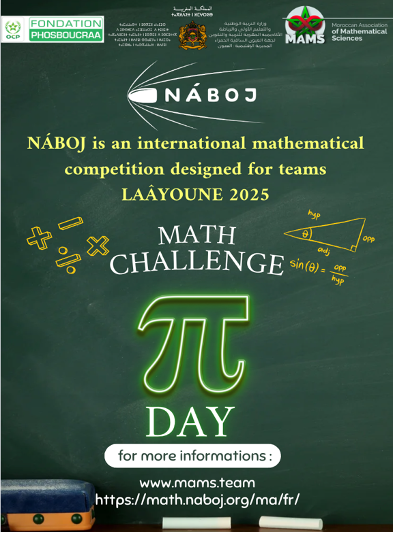 The Moroccan Association of Mathematical Sciences is implementing two distinct projects: a national-scale program supported by the Global Talent Network, and a localized initiative in Laâyoune funded by the Phosboucraa Foundation. Both projects unite under one mission: nurturing young minds with critical thinking and problem-solving skills.
The Moroccan Association of Mathematical Sciences is implementing two distinct projects: a national-scale program supported by the Global Talent Network, and a localized initiative in Laâyoune funded by the Phosboucraa Foundation. Both projects unite under one mission: nurturing young minds with critical thinking and problem-solving skills.
The first program supports the design of initiatives to detect, guide, and stimulate mathematical talent in Moroccan children aged 10 to 14, while the second expands this effort by reaching 18 middle schools across Laâyoune City. After equipping educators through interactive workshops, top students received specialized training in advanced mathematics—covering number theory, algebra, logic, combinatorics, and geometry.
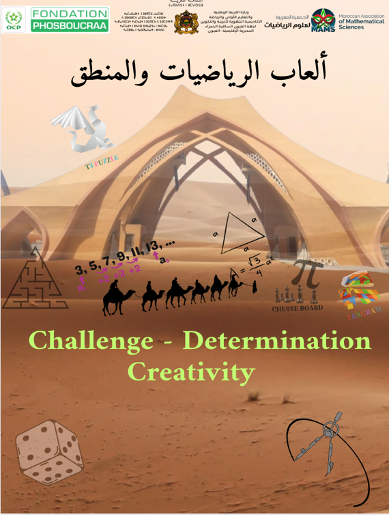
The second program employed a phased training model, alternating between online and in-person sessions. Initial phases included preparatory training, with successive rounds filtering participants down to 90 high-potential students (5 per school in Laâyoune City). The final cohort, selected for aptitude and commitment, represented Morocco at the Náboj international competition on March 14, 2025.
The teams then advanced to the final round, deepening their training in mathematical and logical problem-solving. As part of the competition of Mathematical and Logical Games, they designed and built practical models, which were presented to a panel of experts on May 23, 2025. The event culminated in an awards ceremony honoring the top-performing teams for their innovation and excellence.
.png)
Naboj competition of teams (Laâyoune)
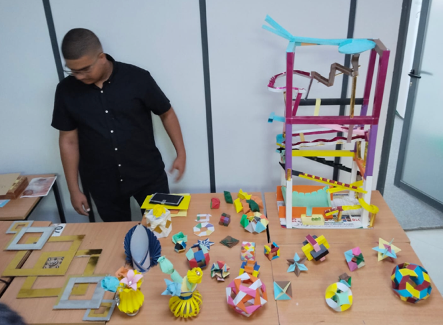
Project team: 3D visualization Origami
Philippines
News from the Philippines
CARLENE PC PILAR-ARCEO, ICMI Representative for the Philippines
International Day of Mathematics
In celebration of the International Day of Mathematics (IDM) 2025, the University of the Philippines (UP) Diliman Institute of Mathematics set up a mini-museum in the third floor lobby of the main building from March 10 to March 14, Pi Day. The mini-museum contained exhibits related to the theme of IDM 2025: Mathematics, Art, and Creativity.
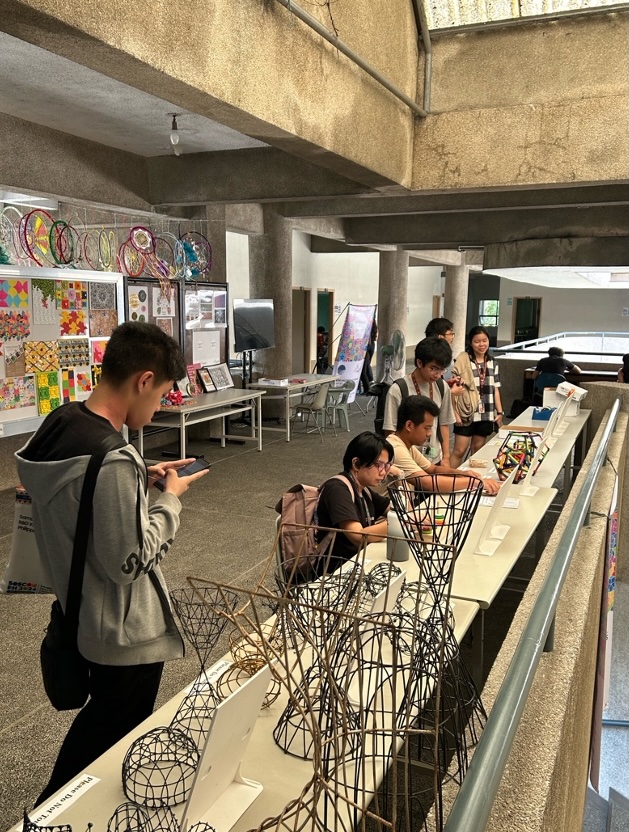 The mini-exhibits featured a diverse range of interactive and educational stations. Dreamcatchers, handmade willow hoops woven with nets and adorned with feathers and beads, were displayed to demonstrate their traditional use in protecting sleepers from bad dreams. Tessellation and pattern artworks created by UP Diliman students showcased intricate designs using various figures, such as animals (cats, chickens, capybaras) and the iconic UP Ikot Jeep. Infographics and videos prepared by the UP Mathematics Majors Circle and the UP Mathematics Club offered additional insights into mathematical concepts.
The mini-exhibits featured a diverse range of interactive and educational stations. Dreamcatchers, handmade willow hoops woven with nets and adorned with feathers and beads, were displayed to demonstrate their traditional use in protecting sleepers from bad dreams. Tessellation and pattern artworks created by UP Diliman students showcased intricate designs using various figures, such as animals (cats, chickens, capybaras) and the iconic UP Ikot Jeep. Infographics and videos prepared by the UP Mathematics Majors Circle and the UP Mathematics Club offered additional insights into mathematical concepts.
At the coloring station, students colored Penrose tilings, the official art of IDM 2025, and were challenged to use the minimum number of colors so that no two adjacent regions shared the same color. Students also crafted their own Möbius strips and explored other figures derived from them. The Platonic solids station allowed students to construct polyhedral graphs and identify dual polyhedra, with handmade models of the Platonic solids available for reference.
At the tangram station, students used tangram pieces to form shapes based solely on their silhouettes. The Tower of Hanoi station featured a puzzle set with up to ten discs, where students were challenged to complete it using the minimum number of moves. Finally, at the quadric surfaces station, students examined physical models of six quadric surfaces to better understand how these surfaces, commonly studied in calculus, appear in three-dimensional space.
On the first day of the exhibit, students from Grades 3 to 10 at the UP Integrated School visited the mini-museum, where they received an orientation about IDM 2025. They also had the opportunity to create Möbius strips and color Penrose tilings. Throughout the week, UP Diliman students participated in the mini-museum activities and gained new insights into mathematical concepts through colors and patterns. To culminate IDM 2025 on Pi Day, the institute held a pie distribution event at 3:14 PM. Following a countdown, over a hundred pie slices were handed out to students.
Overall, the IDM activities at the institute were a success. The institute looks forward to another IDM filled with exciting, interactive experiences that highlight the beauty of mathematics.
MTAP-TL, Inc. Empowers Educators and Learners through March and April 2025 Webinars
In line with its commitment to promoting excellence and innovation in mathematics education, the Mathematics Teachers Association of the Philippines–Tertiary Level (MTAP-TL), Inc. successfully held two engaging webinars in March and April 2025.
The first webinar, held on March 14, 2025, celebrated both the International Day of Mathematics (Pi Day) with the global theme “Mathematics, Art, and Creativity” and National Women’s Month in the Philippines, themed “Babae sa Lahat ng Sektor, Kaagapay sa Pag-angat ng Bagong Pilipinas.” This free online event featured three distinguished speakers who shared powerful insights at the intersection of mathematics, creativity, and empowerment.
Ms. Marie Cris R. Roco-Escape, a teacher from Mambugan National High School and a passionate Gender and Development (GAD) advocate, opened the session with her talk, “XX: Can’t Find the Value of X and Even Questioning Y? [Women’s Participation in the Field of Mathematics],” highlighting the importance of recognizing and empowering women in the field of mathematics. This was followed by Mr. Guillermo Bautista Jr., currently pursuing a Ph.D. in STEAM Didactics at Johannes Kepler University in Linz, Austria, who presented “Fun with Function Art: Integrating Technology, Art, and Mathematics.” He emphasized the integration of creativity and digital tools into math instruction. Lastly, Dr. Aldrin John Jau Estonanto, Associate Professor V at the College of Teacher Education, Sorsogon State University, explored the connection between emotional well-being and math learning in his presentation titled “PsychoMathematics: Mental Health Education in Mathematics Learning.”

Continuing its professional development efforts, MTAP-TL hosted another webinar on April 30, 2025, titled “Think Smart, Solve Fast: Practical Problem-Solving Techniques,” in cooperation with Negros Oriental State University (NORSU) and with the support of Canon Calculators PH as the official sponsor. This session focused on enhancing mathematical thinking and strategic problem-solving.
The webinar began with Engr. Armand G. Macapagong, RMP, proprietor of AGM Engineering Services, who delivered a session on “Strategies for Mathematical Problem Solving,” where he shared effective approaches to tackling mathematical challenges. He was followed by Engr. Romeo Q. Talentino, a professor at National University Manila, who introduced practical methods for simplifying complex calculations and the importance of recognizing and empowering women in the field of mathematics. This was followed by Mr. Guillermo Bautista Jr., currently pursuing a Ph.D. in STEAM Didactics at Johannes Kepler University in Linz, Austria, who presented “Fun with Function Art: Integrating Technology, Art, and Mathematics.” He emphasized the integration of creativity and digital tools into math instruction. Lastly, Dr. Aldrin John Jau Estonanto, Associate Professor V at the College of Teacher Education, Sorsogon State University, explored the connection between emotional well-being and math learning in his presentation titled “PsychoMathematics: Mental Health Education in Mathematics Learning.”
Concluding the event was Mr. Percival Bayron S. Bueser, Senior Assistant Manager at the Actuarial Department of Cocolife, who shared techniques for solving high-level math problems efficiently in his session, “Answering Mathematics Competition Questions with Speed and Elegance.”
Both webinars, conducted via Zoom, were well-attended by MTAP-TL members and their students. These events provided valuable opportunities for professional growth, knowledge sharing, and meaningful engagement in mathematics education across various levels.
South Africa
News from South Africa and the Association for Mathematics Education of South Africa (AMESA):
Dr VG Govender (South Africa Country Representative)
The Association for Mathematics Education of South Africa (AMESA, website https://www.amesa.org.za/) was formed in June 1993. South Africa consists of 9 provinces. Each province is called an AMESA region. In this report we focus on some of our regional activities which took place in March – June 2025.
(1) AMESA Regional Conferences
Region: Free State
Date: April 12 – 13, 2025
Venue: Sentraal Primary School (in Bloemfontein)
Attendance: 355
Region: North-West
Date: May 3, 2025
Venue: Tlhabane Primary School (in Rustenburg)
Attendance: 296
(2) AMESA Limpopo Regional Mathematics Olympiads
Region: Limpopo
Venue: Various primary and high schools
Date: March 1 – 15, 2025
Participation: Grades 4-7: 80,016 pupils.
Grades 8-9: 30,253 pupils, Grades 10-12: 29,830 pupils
(3) South African Mathematics Olympiad (SAMO)
The second round of the South African Mathematics Olympiad (SAMO), for high schools, took place on May 15, 2025. 15,107 pupils from 985 schools wrote this paper. The third round is scheduled for July 31, 2025.
(4) South African Mathematics Challenge (SAMC)
The second round of the South African Mathematics Challenge (SAMC), a competition for primary school students in South Africa, took place on May 22, 2025. 11,097 pupils from 524 schools wrote this paper. The third round is scheduled for September 12, 2025.
Conferences to come
International Group for Mathematical Creativity and Giftedness- (MCG) 14th conference
Dates: on June 16 - 18, 2025
Location: Karlstad, Sweden
More information on the website.
Congresso Iberoamericano de Educação Matemática (X CIBEM)
Dates: 7 - 11 July 2025
Location: Guadalajara, Mexico
More information on the website.
AFRICME-7
Dates: 15 - 18 July 2025
Location: University of Witwatersrand, Johannesburg, South Africa
More information in the announcement.
9th ICMI-East Asia Regional Conference on Mathematics Education (EARCOME 9)
Dates: July 18-22, 2025
Location: Seoul National University, Siheung Campus, Korea,
The theme of the conference is “RE: Visiting the Essence of Mathematics Education in the Era of Digital Transformation.
More information on the website.
Annual Conference of the International Group for the Psychology of Mathematics Education (PME)
Dates: PME 48, July 28 - August, 2, 2025
Location: Santiago, Chile
More information on the website.
International Conference on the Teaching of Mathematical Modelling and Application- ICTMA-22
Dates: August 10 - 15, 2025
Location: Sweden at Linköping University
More information on the website.
IV Congreso de Educación Matemática de América Central y El Caribe (IV CEMACYC)
Dates: November 2-7, 2025
Location: Santo Domingo, Domenican Republic
More information on the website.
The Implementation and Replication Studies in Mathematics Education Conference (IRMEC)
Dates: November 3 to 7, 2025
Location: Mexico City, Mexico
More information on the website.
World Federation of National Mathematics Competitions - WFNMC-10
Dates: 2026 (Date tbc)
Location: Kuala Lumpur, Malaysia
More information on the website.
ICME-16
Dates: July 9-16, 2028
Location: Prague, CZ
More information on the website.